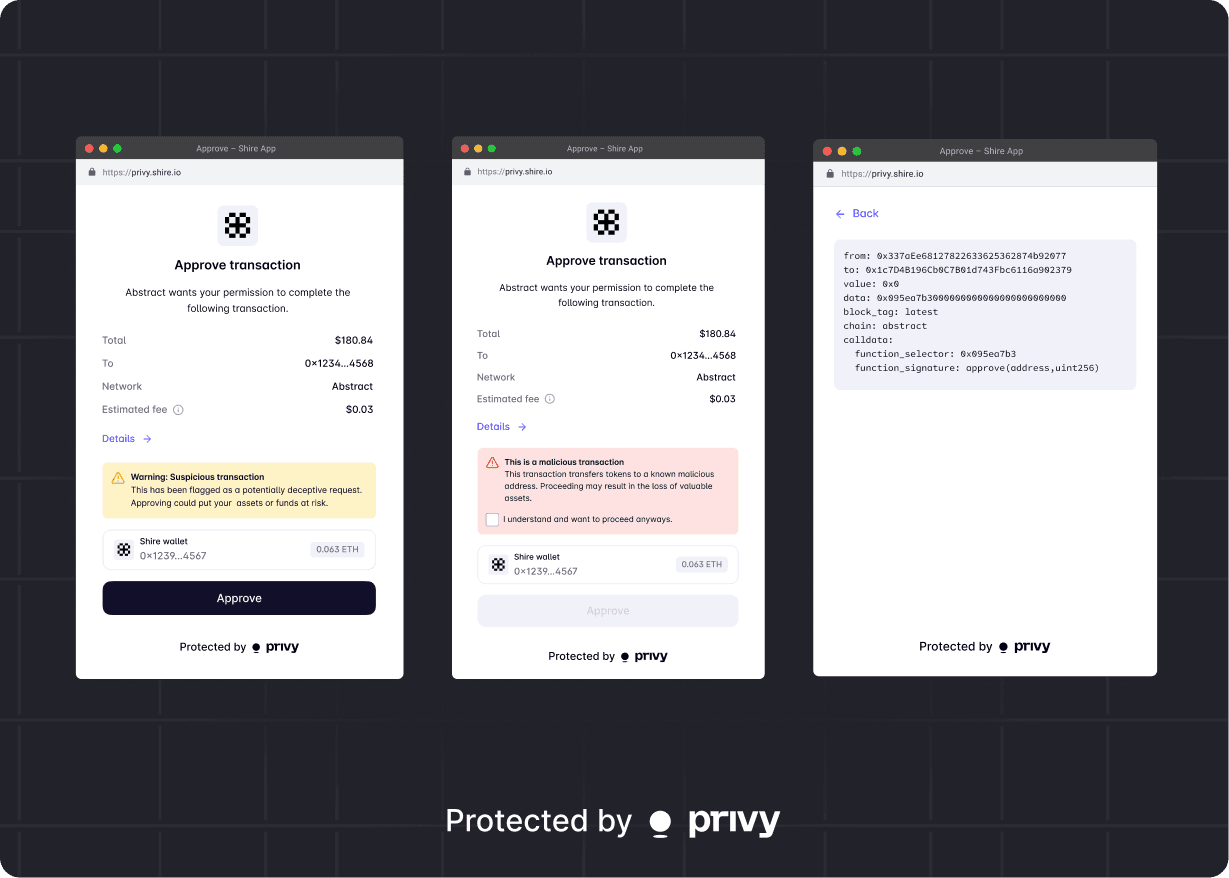Transaction scanning for added wallet security
Now available in Privy Global Wallets, powered by Blockaid—helping users stay safe before they sign.
Madeleine Charity & May
|Apr 1, 2025

Smarter signatures, safer users
Privy now supports transaction scanning for global wallets in partnership with Blockaid
Traditional wallets shine in enforcing user consent for every transaction, but this also creates habits in users, to approve transactions even when they are not what they seem.
The very interoperability that makes interoperable wallets so powerful in enabling seamless connections across apps also creates risk for the user as they can be prompted to sign transactions in sometimes unfamiliar or untrusted environments.
For the most part, embedded wallets are safe from this threat in being tied to a given product and domain—reducing the risks that come with signing in unfamiliar contexts.
Privy’s global wallets make your embedded wallet more easily accessible anywhere, so chosen developers can integrate them into their app. This huge boon to composability also creates risk for the user. Today, we bring transaction simulation in Privy to GA, after working on it with select customers.
We’ve partnered with Blockaid—the powerful onchain security toolkit trusted by MetaMask, Coinbase, Uniswap, and more—to enable transaction scanning for every global wallet transaction. Blockaid simulates billions of transactions in real-time to detect and block malicious activity before it happens. Integrated directly into Privy’s Global Wallets, this means your users are warned of any suspicious transaction before approving it, to reduce the likelihood of unwitting compromise.

What is transaction scanning?
Transaction scanning helps prevent users from unknowingly signing malicious transactions. With Blockaid’s API, Privy can surface whether a transaction is safe, suspicious, or malicious—before the wallet signature is generated.
The integration uses two key components: transaction simulation and transaction validation.
Simulation reveals what a transaction will do before it’s signed. Users see exactly which tokens are moving in or out of their wallet, and the USD value involved—giving them a clearer picture of what they’re about to approve.
Validation checks the transaction against a set of security heuristics and known malicious addresses. Based on the simulation results and threat signals, it categorizes the transaction and flags if anything looks off.
The result: users get clear, actionable signals. If something looks suspicious, they are warned and must override settings to proceed: friction where it matters.
Live today on Abstract
We’ve launched transaction scanning support on the Abstract network, giving all Abstract global wallet users an added layer of security.
If you’re using Privy’s global wallets, transaction scanning is a great next step to introduce to your ecosystem if you want to make it as safe as possible for users. Head over to our docs to learn how to enable transaction scanning for your global wallet.
What’s next
At Privy, all engineering is security engineering. Alongside MFA, fraud detection, advanced recovery settings, blocklists, and more, transaction scanning improves developers’ arsenal so you can leverage Privy to build secure cross-app wallets for your product.
More to come.

